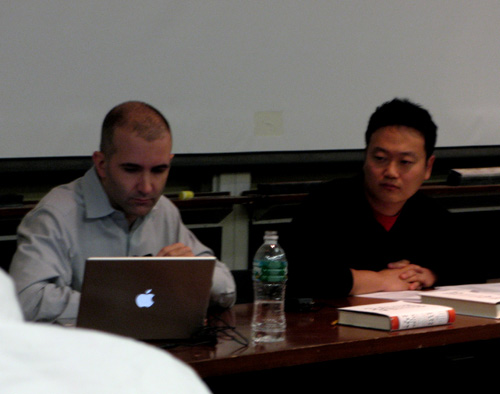Tag: Radiohead
More pencils, more books
My visit uptown coincided with the first day of Spring semester classes at Columbia. Remember how exciting that used to be?

I was last on campus in late October for the talk with New Yorker music critic Alex Ross. Since then, his cultural history of music since 1900, The Rest Is Noise: Listening to the Twentieth Century, has landed on several “Best of 2007” lists including those of The New York Times, New York magazine and Slate. Earlier this month, the book was selected as a finalist for the 2008 National Book Critics Circle Award for Criticism.
Gothamist posted an interview with Ross today, in which he names Radiohead guitarist Jonny Greenwood‘s score to Paul Thomas Anderson’s There Will Be Blood as his current soundtrack to the city. Disappointingly, the 33-minute piece (which has received raves all around) was disqualified from Oscar contention as it recycled parts of Greenwood’s 2005 BBC-commissioned suite “Popcorn Superhet Receiver.”
Ah, we still love you, Jonny.
The Rest is Noise
I always feel a little nostalgic being back on campus, and this night, seated at a desk inside 501 Schermerhorn, I could not help but be reminded of lectures past. Tonight, though, I was here to sit in on an interview with Alex Ross, the classical music critic of the The New Yorker, whose long-anticipated history of music in the twentieth-century was released on October 16. The talk was led by Casper Mao, founding member of The Blue Notebooks, a student-run group presenting interviews with leading writers, artists, and intellectuals at Columbia University.
The Rest Is Noise: Listening to the Twentieth Century addresses the basic question of why when works of Picasso and Pollock are mass-printed on posters, and lines from T. S. Eliot and Robert Frost are known to teenagers across the county, is twentieth-century classical music still considered elite, obscure and inaccessible? Yet despite these seemingly widespread attitudes, classical music seems to have experienced a resurgence in recent years. The United States now has 125 opera companies — more than opera-loving Germany or Italy — whereas fifty years ago there were only a handful. Roughly as many Americans attend live opera performances as attend NFL football games. The reports of the death of classical music, to paraphrase Mark Twain, are greatly exaggerated.

Ross is an engaging writer, and The Rest Is Noise (first chapter here) is his attempt at a whirlwind tour of the last century’s composers and major musical developments. Among the organizing principles is to place music in a wider cultural and political context: not just the (in)famous incidents like the scandals over Arnold Schoenberg‘s atonal works or the riots reacting to the visceral rhythms of Igor Stravinsky’s “The Rite of Spring,” but also for example, Dmitri Shostakovich’s consultations with Joseph Stalin, the inflection of Aaron Copland‘s music by the fashionable communism of New Deal America, and Richard Strauss’s work under the spell of Hitlerian aesthetics. Steve Reich and Philip Glass’s minimalist compositions were inspired by the freestyle independence of jazz and early rock and roll, which in turn later influenced acts like David Bowie, The Velvet Underground and Aphex Twin.

Ross is one of my favorite music critics, and in person as in his writing, he is wittily informative without being judgmental or pedantic. (Above, cuing the severe, brooding bass and cello opening of Jean Sibelius’ Symphony No. 4 to challenge musicology’s general dismissal of the composer as a traditionalist among his “modern” contemporaries.) Ross’s ambitious undertaking has received generally excellent reviews. How can you not like a guy who displays such an unabashed affinity for Björk (she even blurbed his book; Ross met the Icelandic singer-songwriter in 2004), and has championed the likes of Radiohead and 1990s indie rock band Pavement? Plus how many people can effectively work in a “Beavis and Butt-Head” reference when writing about rock chord progression and Jonny Greenwood’s slashing guitar?
Radiohead have stopped playing “Creep,” more or less, but it still hits home when it comes on the radio. When Beavis of “Beavis and Butt-head” heard the noisy part, he said, “Rock!” But why, he wondered, didn’t the song rock from beginning to end? “If they didn’t have, like, a part of the song that sucked, then, it’s like, the other part wouldn’t be as cool,” Butt-head explained.
I could not have said it better myself.
| S | M | T | W | T | F | S |
|---|---|---|---|---|---|---|
| 1 | 2 | |||||
| 3 | 4 | 5 | 6 | 7 | 8 | 9 |
| 10 | 11 | 12 | 13 | 14 | 15 | 16 |
| 17 | 18 | 19 | 20 | 21 | 22 | 23 |
| 24 | 25 | 26 | 27 | 28 | 29 | 30 |
Search
Popular Tags
Categories
Archive
- July 2010
- July 2009
- January 2009
- November 2008
- September 2008
- August 2008
- July 2008
- June 2008
- May 2008
- April 2008
- March 2008
- February 2008
- January 2008
- December 2007
- November 2007
- October 2007
- September 2007
- August 2007
- July 2007
- June 2007
- May 2007
- April 2007
- March 2007
- February 2007
- January 2007
- December 2006
- November 2006
- October 2006
- September 2006
- August 2006
- July 2006
- June 2006